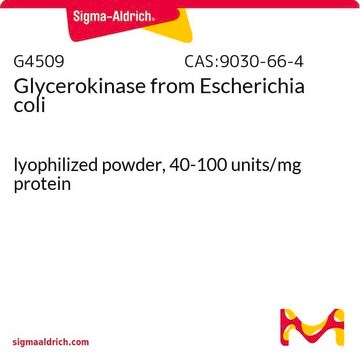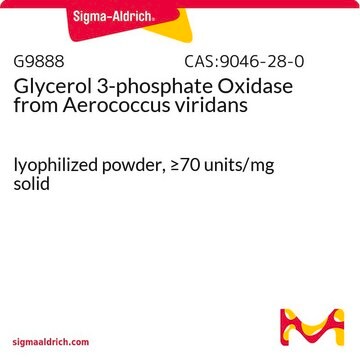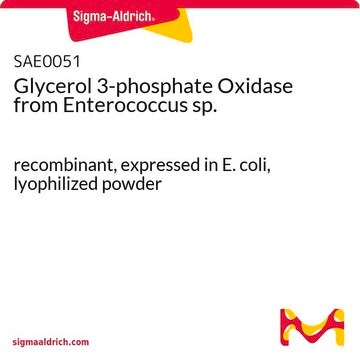G0774
Glycerokinase from Bacillus stearothermophilus
buffered aqueous solution, ≥75 units/mg protein (biuret)
Synonym(s):
ATP:glycerol 3-phosphotransferase, Glycerol Kinase
About This Item
Recommended Products
biological source
Bacillus sp. (Bacillus steaarothermophilus)
Quality Level
assay
≥5.0 mg protein/mL (biuret)
form
buffered aqueous solution
specific activity
≥75 units/mg protein (biuret)
storage condition
dry at room temperature
color
beige
application(s)
life science and biopharma
Storage temp.
2-8°C
Gene Information
Bacillus sp. ... glpK(89613566)
Looking for similar products? Visit Product Comparison Guide
General description
Glycerol kinase is encoded by the GK gene on chromosome Xp21.2. Glycerol kinase is predominantly active in the liver.
Application
Biochem/physiol Actions
Unit Definition
Physical form
signalword
Danger
hcodes
pcodes
Hazard Classifications
Resp. Sens. 1
Storage Class
11 - Combustible Solids
wgk_germany
WGK 3
flash_point_f
Not applicable
flash_point_c
Not applicable
ppe
Eyeshields, Gloves, type N95 (US)
Choose from one of the most recent versions:
Certificates of Analysis (COA)
Don't see the Right Version?
If you require a particular version, you can look up a specific certificate by the Lot or Batch number.
Already Own This Product?
Find documentation for the products that you have recently purchased in the Document Library.
Our team of scientists has experience in all areas of research including Life Science, Material Science, Chemical Synthesis, Chromatography, Analytical and many others.
Contact Technical Service









